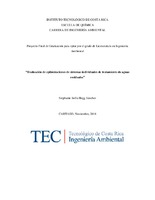Evaluación de optimizaciones de sistemas individuales de tratamiento de aguas residuales
Abstract
In Costa Rica, 76.9% of the Costa Rican population uses septic tanks as the primary method of domestic wastewater treatment (Twenty-Second State of the Nation, 2016). Despite the wide coverage of treatment of this type of systems, it is estimated that between 10% and 20% of septic systems malfunction, resulting in contamination of surface and groundwater (Hogjian et al, 2017). This type of systems have hydraulic inefficiencies as dead zones or short-circuits, which limit their good performance (Picado, 2016), so it is relevant to improve the configuration of these treatment units. This investigation addresses the effect of modifications in two types of anaerobic filter septic tanks (FAFA) for the treatment of domestic wastewater. The optimization contemplates: expansion of the inlet and outlet piping to the width of the cross section, the installation of baffle screens in the septic tanks and the change of the filter medium in the anaerobic stone filter to plastic medium which has greater porosity. The effect of the optimization was evaluated by means of tracer test for the hydraulic behavior, and water quality tests in terms of pH, Temperature, DBO and SST. The results that the modified septic tanks are a good treatment system, obtaining average efficiencies of 39% in DBO and 73% SST for the septic tank with individual FAFA while for the septic tank with integrated FAFA there are efficiencies of 51% DBO and 88% SST. In economic terms, considering the environmental and operation and maintenance benefits, the application of these modifications generate positive cost-benefit relationships that make the implementation of these improvements viable.
Description
Proyecto de Graduación (Licenciatura en Ingeniería Ambiental) Instituto Tecnológico de Costa Rica, Escuela de Química, 2018.


